

Edwebet70. Photos For Class - The quick and safe way to find and cite images for class! SourceEvaluationActivityGuide. Blog Basics: Copyright and Fair Use. Introduction As you write blog posts, you may find that you want to include images you find online.
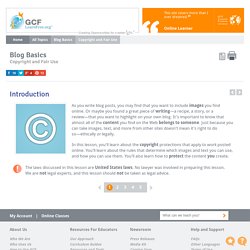
Or maybe you found a great piece of writing—a recipe, a story, or a review—that you want to highlight on your own blog. It's important to know that almost all of the content you find on the Web belongs to someone. Just because you can take images, text, and more from other sites doesn't mean it's right to do so—ethically or legally. In this lesson, you'll learn about the copyright protections that apply to work posted online. The laws discussed in this lesson are United States laws. Renee Hobbs at the Media Education Lab. You know that it is legal to “rip” DVDs for some educational purposes, right?
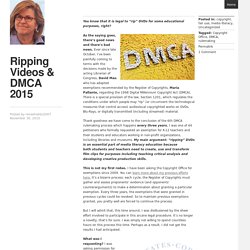
As the saying goes, there’s good news and there’s bad news. Ever since late October, I’ve been painfully coming to terms with the decisions made by the acting Librarian of Congress, David Mao, who has adopted exemptions recommended by the Register of Copyrights, Maria Pallante, regarding the 1998 Digital Millennium Copyright Act (DMCA).
There is a special provision of the law, Section 1201, which regulates the conditions under which people may “rip” (or circumvent the technological measures that control access) audiovisual copyrighted works on DVDs, Blu-Rays, or digitally transmitted (including streamed) material. Thank goodness we have come to the conclusion of the 6th DMCA rulemaking process which happens every three years. More Information on Fair Use. More Information on Fair Use Fair use is a legal doctrine that promotes freedom of expression by permitting the unlicensed use of copyright-protected works in certain circumstances.
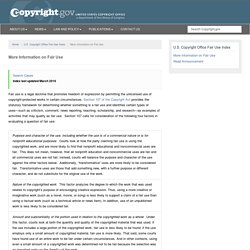
Section 107 of the Copyright Act provides the statutory framework for determining whether something is a fair use and identifies certain types of uses—such as criticism, comment, news reporting, teaching, scholarship, and research—as examples of activities that may qualify as fair use. Section 107 calls for consideration of the following four factors in evaluating a question of fair use: Purpose and character of the use, including whether the use is of a commercial nature or is for nonprofit educational purposes: Courts look at how the party claiming fair use is using the copyrighted work, and are more likely to find that nonprofit educational and noncommercial uses are fair. Copyright And Fair Use: Lesson Plans for High School, College and Graduate Education. Copyright Clarity: Using Copyrighted Materials for Digital Learning. Goodbye, Boring Database Instruction. Hello, Search App Smackdown!
Illustrations By Lars Leetaru Librarians are keenly aware of the value of teaching students to use databases.
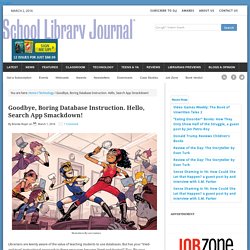
But has your “tried-and-true” instructional approach to these resources become “tired-and-boring?” If so, flip your instruction into a Search App Smackdown! This fun, challenging, and competitive gaming approach meets the American Association of School Librarians’ 21st-Century Learning Standards, skillfully integrating technology and standards by putting kids in the driver’s seat. First of all…databases? Search – Imagine Easy Academy Website Evaluator. Educational Technology, Materials, and Services to Inspire Students. The Advanced Google Searches Every Student Should Know - November Learning. “Did he seriously just ask that?
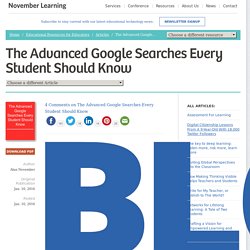
How old is this guy?” Well yes, I recently seriously just asked a group of students if they knew how to search Google. And yes, the students got a good laugh from my question. “Of course I know how to use Google,” I have been told by every student to whom I have asked the question. “Really? The truth is that every student can use Google on some level. If you watch your students use Google you will probably observe that most begin their search by simply typing the title of the assignment verbatim into Google (i.e., Iranian Hostage Crisis). After their results pop up, most students will look only at the first screen of results, believing that those top hits contain everything they will need to complete their assignment.
But what happens when a meaningful search requires more thinking than simply typing in the assignment? Information Literacy. Curriculum Framework - Library Model Curriculum. Model Curriculum » Pennsylvania School Librarians Association. The Model Curriculum for Pennsylvania School Library Programs provides a curricular framework in information literacy for school librarians to partner with teachers to help students achieve 44 of the PA Core Standards in English Language Arts, Reading and Writing in Science and Technology/Technical Subjects, Reading and Writing in History and Social Studies, and in the Academic Standards for Business, Computer, and Information Technology.
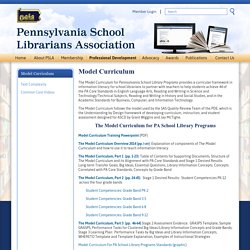
The Model Curriculum follows the model used by the SAS Quality Review Team of the PDE, which is the Understanding by Design framework of developing curriculum, instruction, and student assessment designed for ASCD by Grant Wiggins and Jay McTighe. The Model Curriculum for PA School Library Programs. How to Use Gmail’s Keyboard Shortcuts & Create Custom Shortcuts. To become a Gmail power user, you’ll need to master Gmail’s keyboard shortcuts.
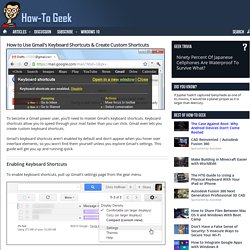
Keyboard shortcuts allow you to speed through your mail faster than you can click. Gmail even lets you create custom keyboard shortcuts. Gmail’s keyboard shortcuts aren’t enabled by default and don’t appear when you hover over interface elements, so you won’t find them yourself unless you explore Gmail’s settings. This guide will get you up and running quick. Enabling Keyboard Shortcuts To enable keyboard shortcuts, pull up Gmail’s settings page from the gear menu. Select the “Keyboard shortcuts on” option on the General pane, and then click the Save Changes button at the bottom of the page.
Google Search Infographic3.pdf. 6th – 8th Grade Search Lesson. In this lesson we will be teaching about domain extensions and the Google Search Syntax ‘site’: as well as how to turn on reading levels in Google Advance Search.
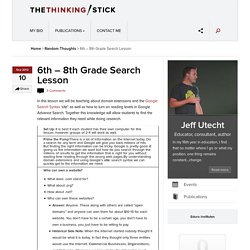
DuckDuckGo. A Google Alternative Safe Search Engine for Students. ICT Literacy. Apply Technology EffectivelyUse technology as a tool to research, organize, evaluate and communicate informationUse digital technologies (computers, PDAs, media players, GPS, etc.), communication/networking tools and social networks appropriately to access, manage, integrate, evaluate and create information to successfully function in a knowledge economyApply a fundamental understanding of the ethical/legal issues surrounding the access and use of information technologies Additional resources: 1.
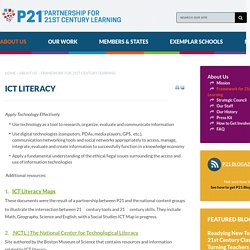
Il%20sixtheighth.pdf. Library%20Curriculum%20K-12.pdf. Middle School Information Literacy & Libraries. Badges – Information Literacy. As part of a UCF pilot project, digital badges are awarded to students for completion of any of UCF’s Information Literacy Modules.
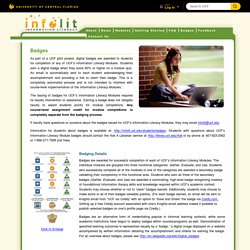
Students earn a digital badge when they score 80% or higher on a module quiz. The Harker School: Information Literacy. The Harker School's mission to "educate students for success at college and beyond," and for "the development of intellectual curiosity" gave rise to a library program that embraces a robust information literacy curriculum. Working collaboratively with classroom teachers, library faculty instruct students to effectively access, evaluate and use information from print and electronic sources through integrated curricula and collaborative instruction with classroom teachers and support from the instructional technology department. Information literacy is a broad scope of skills that enables a person to access, evaluate and use information efficiently, effectively, critically, creatively and ethically. The Harker School: Tools. WebEvaluationWorksheet.pdf. WebEvaluationChecklist.pdf. News – Information Literacy.
Faculty – Information Literacy. Information Literacy Module Demo What are the Information Literacy Modules? The University of Central Florida Information Literacy Modules are funded by the Information Fluency (IF) Initiative and developed by the UCF Libraries and the Center for Distributed Learning (CDL). The modules are instructional resources that faculty can integrate into their courses to help students learn information literacy skills. Please click play on the module demo for a brief overview about module content and features. The demo provides an inside look at the three sections included in each module: content, practice questions with feedback, and scored assessment questions. Modules Titles: About – Information Literacy.
What is Information Literacy? Information Literacy is a set of abilities associated with accessing, retrieving, and ethically using information. Being able to search for relevant information, evaluate sources, and cite information effectively in a paper or project is important for course work. Also, employers are interested in hiring individuals with information and technology skills who have the ability to evaluate the reliability of information and present it in an effective way.
Badges – Information Literacy. Want to show the world how information literate you are? Want to prove that you can gather, evaluate and use information ethically? Now you can earn digital badges each time you complete any of UCF’s Information Literacy Modules. How do you earn these smokin’ hot badges, you ask? Score over 80% or higher on any module quiz!
Then claim your badge (“Save and Share”) by responding to the email sent to your Knights email account from “UCF Libraries via Credly.” How can you earn the gold badge showing your mastery of information literacy? Be sure to complete any modules assigned to you by your professor using the link provided in class, or you can complete the ‘generic’ modules on your own here: (Tip: If you’ve already completed a module that is assigned later for a course, many instructors will allow you to import your previous score for credit in the new course.) KeystonePrizePDF2.pdf. Web Eval - Peview. Evaluating Web Pages: Techniques to Apply & Questions to Ask. S.O.S. for Information Literacy. S.O.S. for Information Literacy. S.O.S. for Information Literacy. S.O.S. for Information Literacy.
Students will learn research skills while researching one notable person of Hispanic descent. Students will research one person, of their choice, and write a biographical sketch. Students can choose politicians, musicians, athletes, actors, etc., as long as they are of Hispanic descent. S.O.S. for Information Literacy. Students explore a website while trying to answer a short question sheet about the Pacific Northwest Tree Octopus. When the questions have been answered they are asked to evaluate the website itself. This leads to the realization that the website is a well-known hoax and that it’s difficult to evaluate the truthfulness of Internet resources. S.O.S. for Information Literacy. S.O.S. for Information Literacy. SLMS gives a mini-lesson on perspectives and how authors choose what to put in or leave out of their texts Written on chart paper: "We don't see things as they are, we see things as we are.
" Authors have different perspectives. S.O.S. for Information Literacy. S.O.S. for Information Literacy. S.O.S. for Information Literacy. Information Literacy.